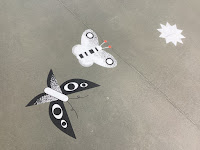I am liveblogging from the WILU conference In Vancouver, Canada. Charting the Course: Embracing RUSA's Guidelines for Secondary Source Literacy by Kristen Howard (Liaison Librarian, McGill University, Canada). Apologies that there were lots of examples given, and I haven't been able to capture all/most of them.
She introduced the RUSA guidelines and identified how secondary sources allow researchers "to engage with scholarly conversations about history". Also engaging with secondary sources require evaluation etc. skills. Howard introduced her context: McGill history and classics department has 450 majors and 275 minors. She then described some ways she had changed her teaching after examining the RUSA guidelines. For example, in talking about "Why are there so many places to search" this includes acknowledging that this can be overwhelming, but explaining how each source has its function and biases and what support there is for searching. One tip from another session on search headings was saying that subject headings are like hashtags.
Howard highlighted learning objective 2.5 ("Trace citations to find additional sources relevant to a research project. Examine works cited in secondary sources to find earlier sources, including primary sources. Use citation search tools to find more recent work that cites relevant sources.") and how she used Google Scholar to find a title and chain backwards and forwards.
Learning objective 4.2 is "Critically evaluate the perspective of the creator(s), including authority, tone, subjectivity, biases, social context(s), methods, and/or guiding theories, and consider how these relate to the original purpose(s) and audience(s) of the source." and Howard talked about using a framework that could be used for primary or secondary sources to reflect on who the creator is and why they are writing etc.
Howard is also aiming to integrate the RUSA learning objectives into the general departmental learning objectives for history. She gave numerous examples of the goals for secondary source skills in these departmental document, compared with what is in the RUSA guidelines. For example, for "research skills" the historians say that students are "expected to organize their own research strategy" which is rather vague (with assumptions about what is already understood), and so there can be conversation about incorporating some more explanatory detail from the RUSA guidelines. There was less agreememt in the area of use of resources (for example, the departmental guidelines focusing on aspects such as engaging and critiquing arguments, the RUSA mentioning summarising and critiquing the stance of the creator).
Altogether Howard was finding the RUSA guidelines useful for her practice and in efforts to update the departmental learning objectives.
Photo by Sheila Webber: art on the floor at the Kwantlen Polytechnic University, May 2024
Curating information literacy stories from around the world since 2005 - - - Stories identified, chosen and written by humans!
Thursday, May 16, 2024
Embracing RUSA's Guidelines for Secondary Source Literacy #WILU2024
Subscribe to:
Post Comments (Atom)

No comments:
Post a Comment